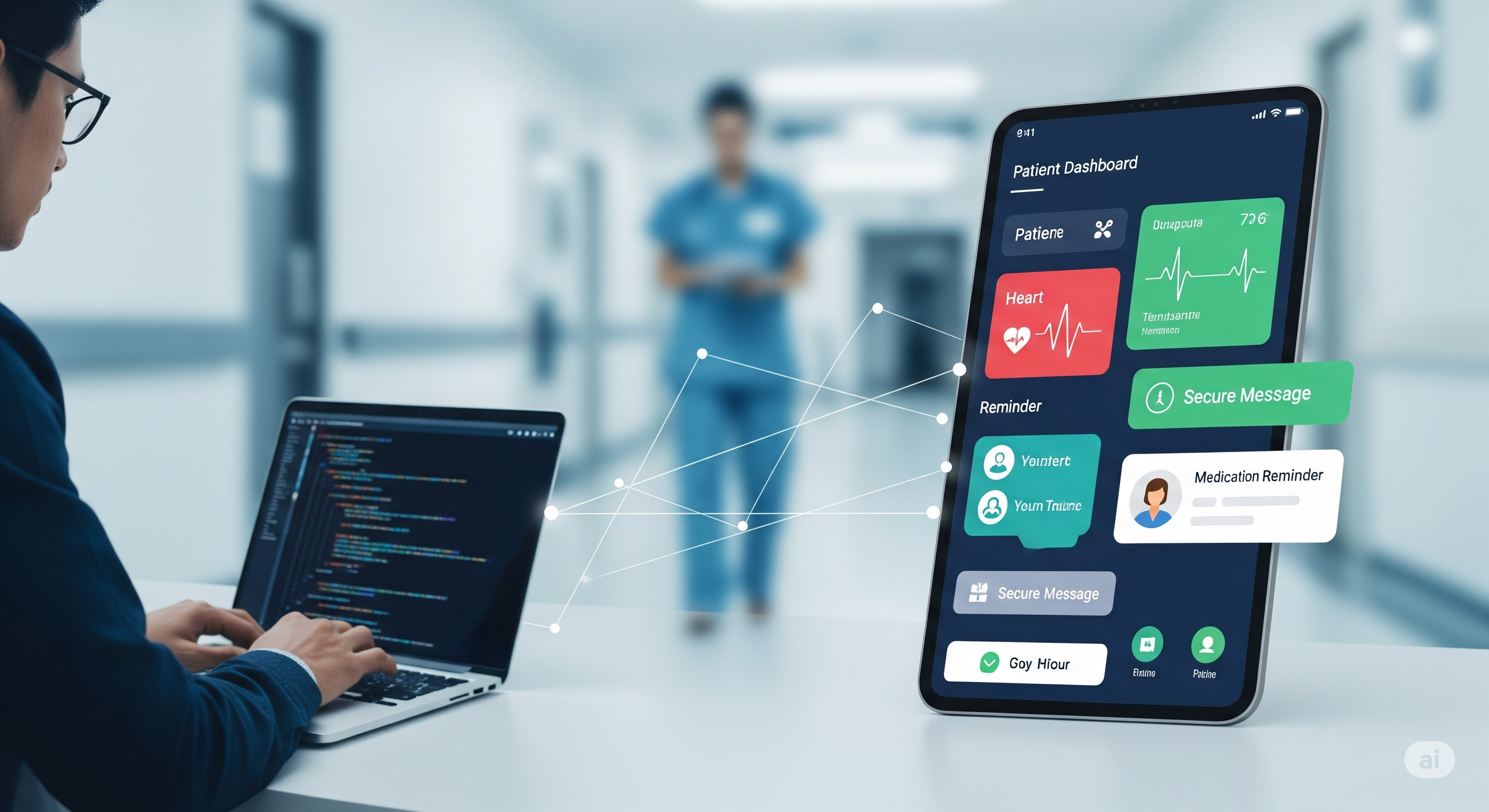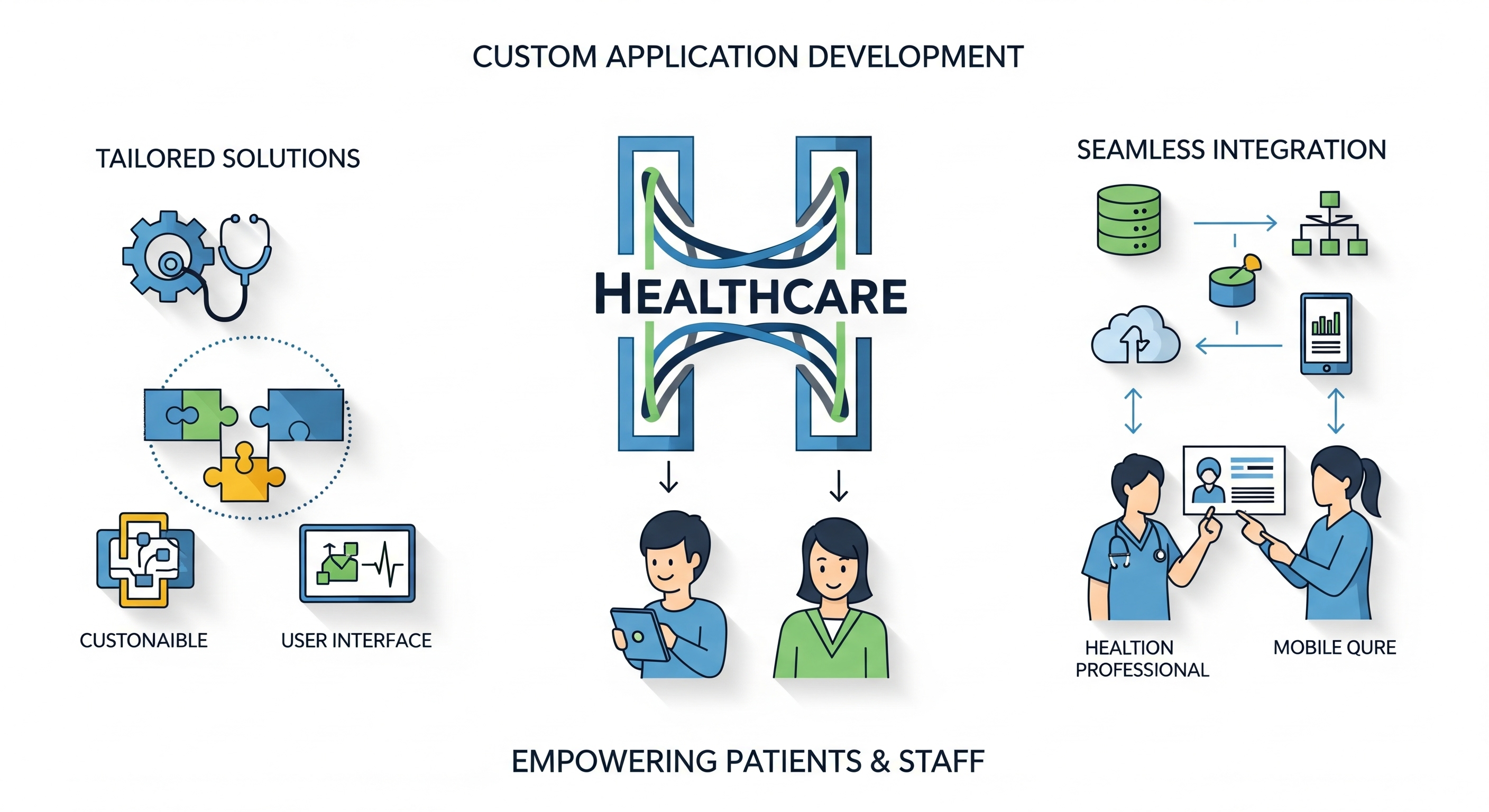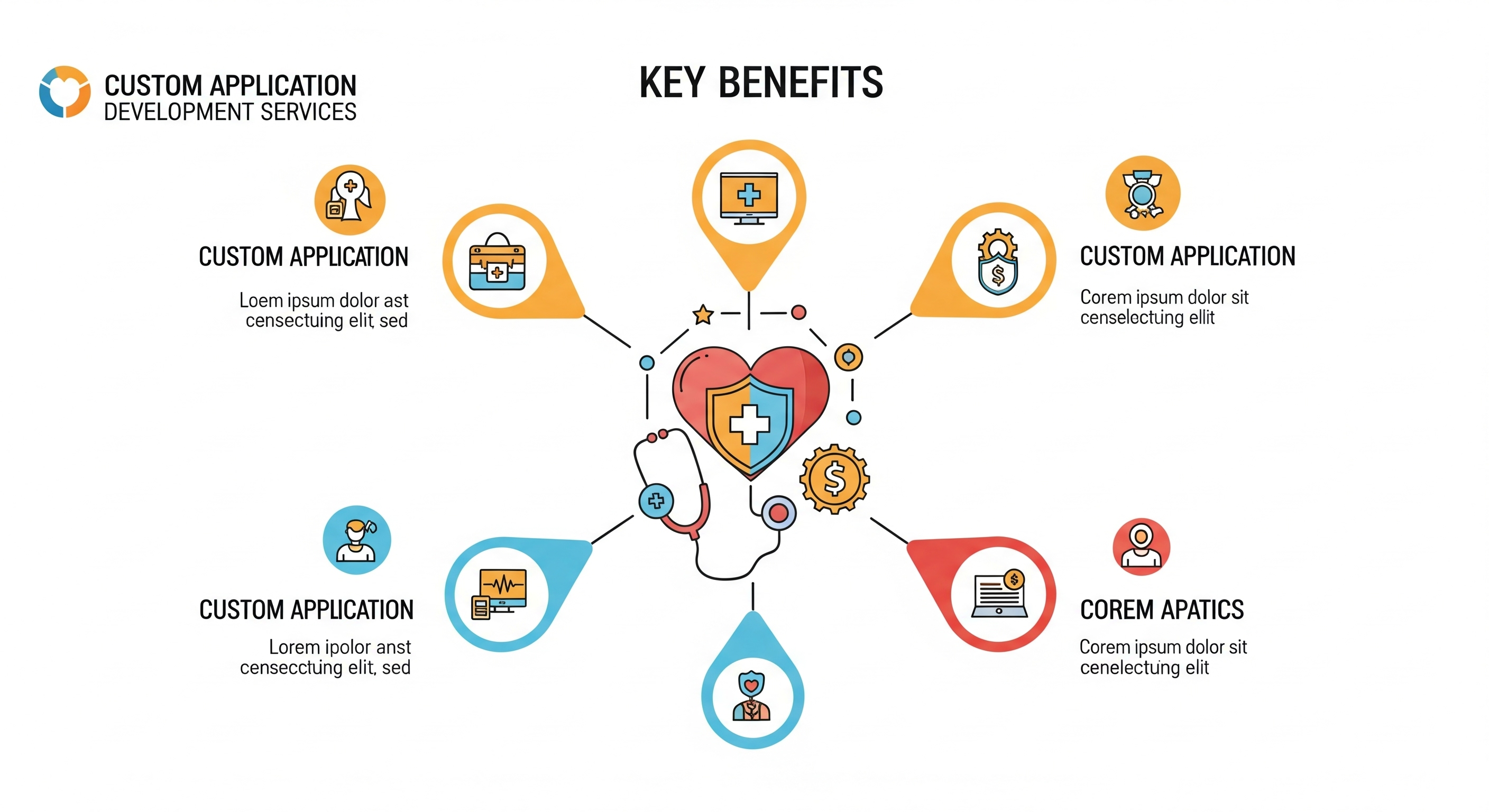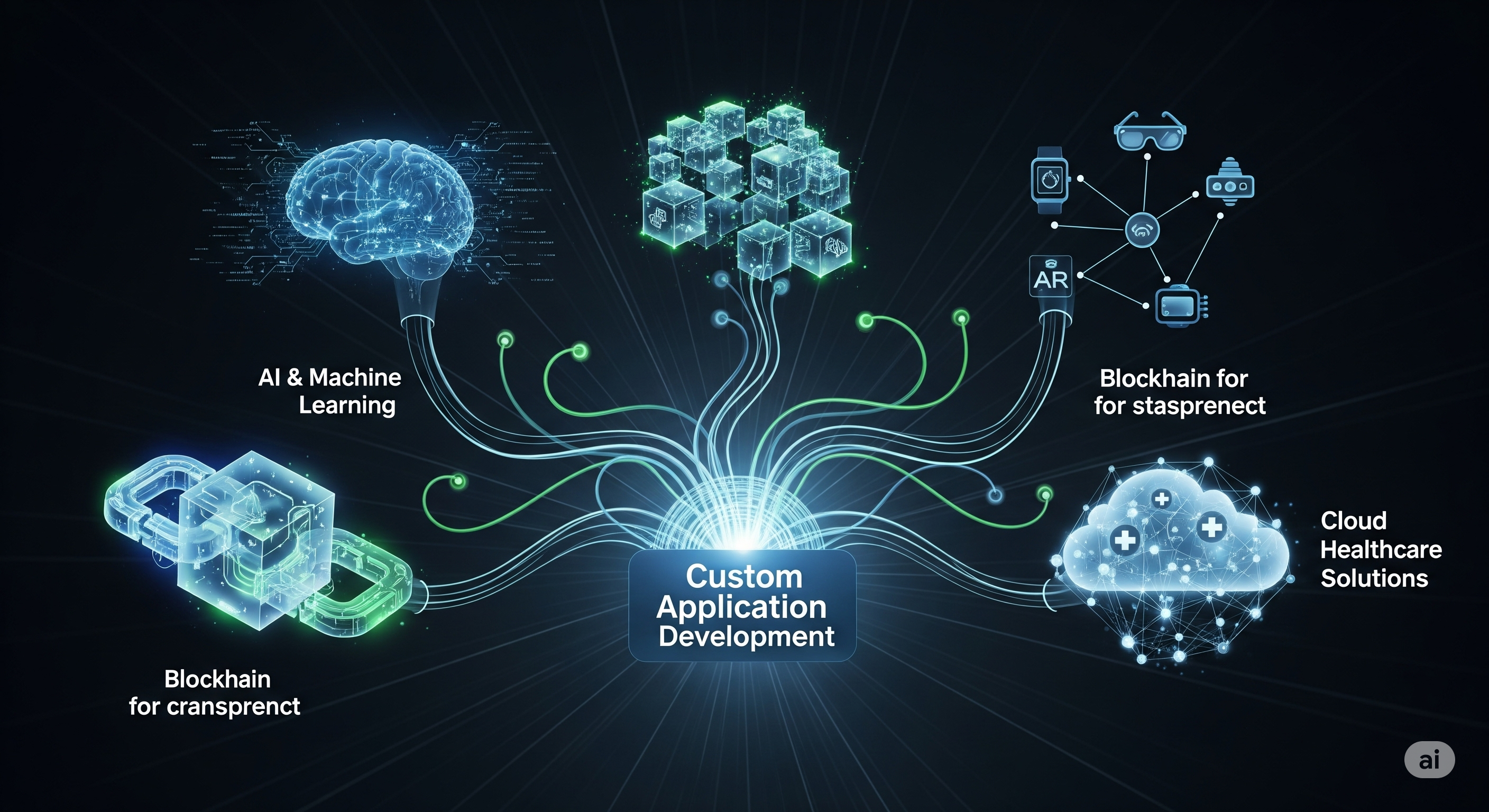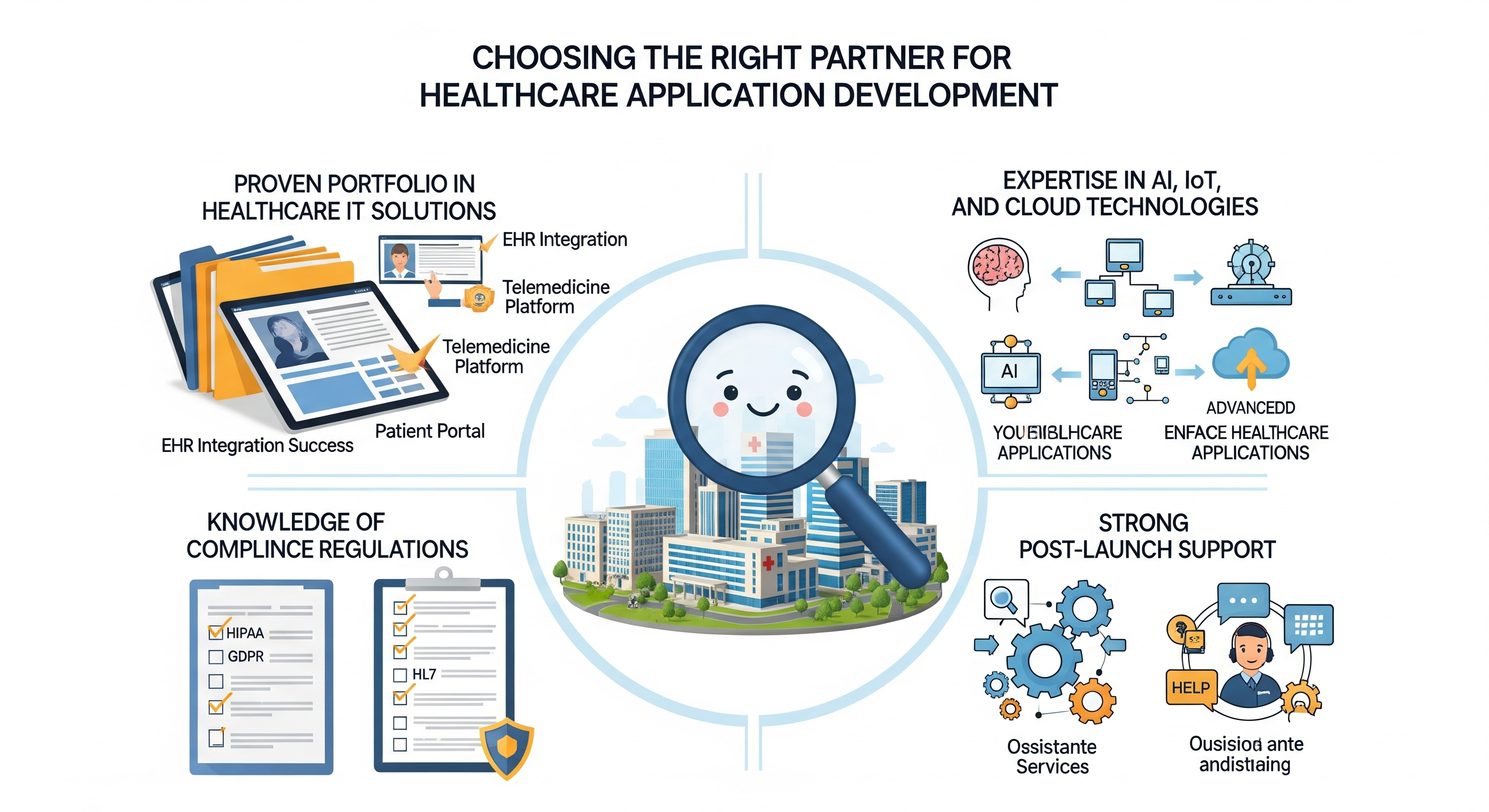How Custom Application Development Services Are Revolutionizing Healthcare
Healthcare is undergoing one of the fastest digital transformations in history. With the rise of custom application development services, hospitals, clinics, and healthcare providers are moving away from outdated, one-size-fits-all systems. Instead, they are adopting tailored software solutions that improve patient care, streamline operations, and ensure compliance with regulations.
Key Points of the Blog
- Custom applications improve patient engagement, security, and hospital efficiency.
- Emerging technologies, such as AI, IoT, and Blockchain, make healthcare apps smarter.
- The future of healthcare lies in hyper-personalized, data-driven applications.
Imagine a hospital where doctors can instantly access electronic health records (EHRs), patients can book telemedicine appointments with just one tap, and billing is automated to minimize delays. This isn’t the future—it’s already happening thanks to custom applications.
The Rise of Custom Application Development Services in Healthcare
The demand for custom application development services in healthcare has grown rapidly as providers face increasing challenges in data management, regulatory compliance, and patient engagement. Off-the-shelf tools often prove inadequate because they lack the flexibility to adapt to specific institutional workflows or integrate with outdated legacy systems.
Tailored Solutions for Healthcare Needs
Unlike generic software, custom healthcare applications are designed to match an institution’s exact requirements. This ensures that hospitals, clinics, and private practices can streamline processes while maintaining full control over features and functionality.
Seamless Integration with Existing Systems
A major advantage of custom healthcare software is its ability to integrate with medical devices, electronic health records (EHRs), and customer relationship management (CRM) systems. This creates a unified digital ecosystem that reduces data silos and improves coordination between departments.
Empowering Patients and Staff
Custom medical applications also prioritize secure, user-friendly access for both staff and patients. Physicians benefit from real-time access to accurate health data, while patients can use intuitive platforms for scheduling, telemedicine, and managing personal health records.
Example in Action
For instance, in Switzerland, private clinics are increasingly investing in custom telemedicine applications. These apps enable remote consultations and extend healthcare services to rural areas, ensuring greater accessibility while maintaining high standards of care.
An experienced custom application development company understands the unique challenges of the healthcare industry. From digitizing patient records to creating telemedicine platforms, they design applications that integrate smoothly with existing systems and workflows.
Key Benefits of Custom Application Development Services for Healthcare
1. Enhanced Patient Care & Engagement
Custom applications allow patients to book appointments, access lab reports, and receive medication reminders through user-friendly apps.
Example: A diabetes management app with customized diet charts and real-time glucose tracking.
2. Seamless EHR Integration
Unlike generic tools, custom applications integrate with Electronic Health Records (EHRs), reducing errors and ensuring doctors have full patient histories.
3. Strong Data Security & Compliance
With strict healthcare regulations like HIPAA and GDPR, data security is non-negotiable. Custom apps offer end-to-end encryption, role-based access, and secure cloud storage.
4. Operational Efficiency
Hospitals benefit from automated workflows such as digital prescriptions, billing systems, and patient monitoring dashboards.
Example: A hospital ERP system that reduces paperwork by 70%.
5. Cost Optimization
Although custom solutions may require upfront investment, they reduce long-term costs by minimizing downtime, errors, and reliance on multiple third-party tools.
By working with a custom application development company, healthcare providers gain apps that improve patient engagement, ensure secure EHR access, and optimize hospital operations. These tailored solutions reduce inefficiencies and deliver measurable results.
How Emerging Technologies Power Custom Application Development Services
Custom healthcare applications are not built in isolation—they are increasingly powered by emerging technologies that make them smarter, more secure, and more adaptable to modern healthcare needs. By integrating these innovations, custom apps transform the way patients and providers interact, diagnose, and deliver care.
AI & Machine Learning
Artificial Intelligence (AI) and Machine Learning (ML) are revolutionizing custom apps by enabling predictive analytics. These technologies analyze patient histories, medical images, and lifestyle data to predict potential health outcomes, helping providers move from reactive to preventive care.
Blockchain for Security and Transparency
Blockchain technology ensures the secure and transparent exchange of patient records across systems and institutions. With features like immutability and encryption, it reduces the risk of data breaches while ensuring that only authorized personnel can access sensitive medical information.
IoT and Wearable Devices
Internet of Things (IoT)-enabled devices—such as smartwatches, fitness trackers, and medical-grade wearables—provide real-time health data to custom apps. This continuous monitoring allows doctors to detect early warning signs, track chronic conditions, and improve remote patient care.
Cloud Healthcare Solutions
Cloud-based platforms provide the scalability and flexibility that multi-location hospitals and clinics need. They enable centralized access to patient data, telemedicine services, and seamless collaboration between departments—ensuring efficiency without compromising security.
Example in Action
For instance, a custom AI-driven chatbot can assist patients 24/7 by analyzing symptoms, offering preliminary guidance, and then directing them to the right doctor. This not only enhances patient experience but also reduces the burden on healthcare staff.
A skilled custom application development company can build solutions like telehealth apps, AI-powered diagnostic platforms, or hospital ERPs that fit your organization’s needs. They customize proven models to ensure scalability and long-term value.
Challenges in Healthcare and How Custom Applications Solve Them
The healthcare industry faces several long-standing challenges that often limit efficiency, patient care, and regulatory compliance. Custom application development services provide tailored solutions to address these issues and drive digital transformation.
1. Breaking Down Data Silos
One of the biggest hurdles in healthcare is data silos, where critical patient information is trapped in separate departments or outdated systems. Custom applications unify data across departments, enabling doctors, nurses, and administrators to access accurate, real-time records for better decision-making.
2. Solving Interoperability Issues
Healthcare providers rely on multiple tools, from EHR systems to billing software. These often fail to communicate with one another, creating interoperability challenges. Custom apps integrate with existing systems through APIs, ensuring smooth data exchange and minimizing workflow disruptions.
3. Reducing Compliance Burden
Compliance with HIPAA, GDPR, and other healthcare regulations is mandatory but complex. Custom healthcare applications come with built-in compliance features such as data encryption, access controls, and audit trails. This not only secures patient information but also reduces legal and financial risks.
4. Replacing Legacy Systems
Many hospitals still rely on legacy IT infrastructure that slows down operations. Modern custom applications replace these outdated systems with scalable, secure, and user-friendly platforms. This ensures healthcare organizations remain agile and ready to adopt innovations.
Example in Action
For instance, a Swiss hospital digitized its paper-based patient records into a custom electronic health records (EHR) platform. As a result, record retrieval time dropped from 30 minutes to under 2 minutes—dramatically improving both efficiency and patient care.
With the guidance of a forward-thinking healthcare IT solutions company, providers can adopt predictive analytics, personalized medicine, and VR-based therapies—driving innovation in patient care.
How to Choose the Right Company for Custom Application Development Services in Healthcare
Selecting the right custom healthcare software development company requires careful consideration. Healthcare applications demand not only technical expertise but also compliance with strict regulations and ongoing support. Below are the key factors to evaluate when making your choice:
1. Proven Portfolio in Healthcare IT Solutions
A strong track record in healthcare projects shows that the company understands the sector’s challenges—such as electronic health records (EHR), telemedicine, and patient management systems. Reviewing case studies and client references can help you assess their reliability.
2. Knowledge of Compliance Regulations
Healthcare is highly regulated, with frameworks like HIPAA, GDPR, and HL7 setting strict standards for patient data security. Choosing a partner with in-depth compliance knowledge ensures your software is built to meet these requirements, avoiding legal risks and safeguarding sensitive information.
3. Expertise in AI, IoT, and Cloud Technologies
Modern healthcare is evolving rapidly with AI-driven diagnostics, IoT-enabled medical devices, and cloud-based patient portals. A company skilled in these technologies can future-proof your application and enable innovation that improves both clinical efficiency and patient care.
4. Strong Post-Launch Support
Software in healthcare cannot afford downtime. Ensure your development partner provides long-term maintenance, security updates, and feature enhancements. Continuous support guarantees that your application adapts to new regulations, technologies, and patient needs.
Example in Action
Consider a hospital selecting a partner with proven HIPAA-compliant app development expertise. From the start, this choice not only ensures data security but also protects the organization from compliance-related risks, setting a foundation for trust and safety.
Selecting the right custom healthcare software partner is critical. Look for proven expertise in compliance, strong healthcare portfolios, and post-launch support to ensure your apps remain secure, scalable, and future-proof.
Conclusion
Custom application development services are not just reshaping healthcare—they are redefining how doctors, patients, and institutions interact. From improved patient engagement to stronger security and cost savings, custom apps are the backbone of modern healthcare. For providers aiming to deliver personalized, efficient, and compliant care, investing in custom applications is no longer optional—it’s essential.
FAQs
1. What are custom application development services in healthcare?
Custom application development services in healthcare involve building tailored software solutions for hospitals, clinics, and patients to improve care, efficiency, and compliance.
2. How do custom healthcare applications improve patient care?
They enhance patient engagement with features like appointment booking, telemedicine, medication reminders, and access to digital health records.
3. Why are custom applications better than off-the-shelf healthcare software?
Custom apps are designed for specific workflows, integrate with existing systems, and meet compliance standards—unlike generic tools.
4. What technologies power custom application development in healthcare?
AI, blockchain, IoT, and cloud computing are key technologies enabling smarter and more secure healthcare applications.
5. How much do custom application development services cost in healthcare?
Costs vary depending on complexity, features, compliance needs, and integrations, typically ranging from mid to high investment levels.
6. What security features are included in custom healthcare applications?
They include data encryption, secure APIs, role-based access, and HIPAA/GDPR compliance to protect patient information.
7. Can small clinics benefit from custom application development services?
Yes, even small clinics can use custom apps for scheduling, patient portals, and secure data storage—improving efficiency.
8. What is the future of custom application development in healthcare?
The future involves predictive analytics, personalized patient apps, VR-based therapies, and AI-driven healthcare assistants.
